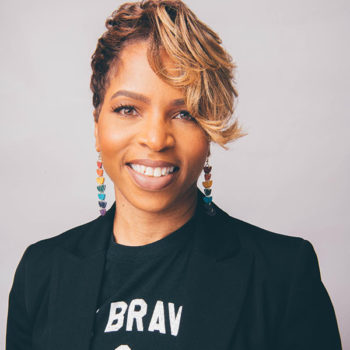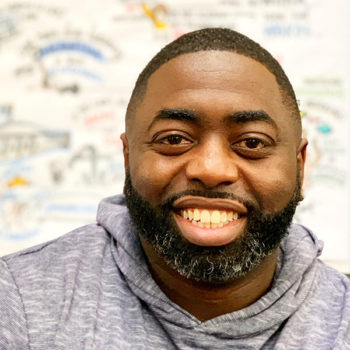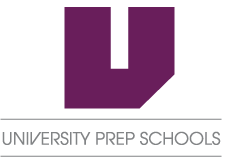
We are celebrating our 20th year of serving families in Detroit. Our investment in innovation and transformation plays a pivotal role in our scholars’ success. In honor of that, we are launching U Prep’s first blog, “The U Crew Collective”. I have the pleasure of celebrating a phenomenal crew as they showcase lessons learned, how we respond to new challenges, and ways we celebrate our scholars’ brilliance. I hope you find helpful information, resources you can use right now, topics that generate dialogue about your practice here or in your school, or inspiration in your pursuit of excellence in educating our children.
In our inaugural post, I have asked Dr. Curtis Lewis to share how Culturally Responsive Education informs his leadership as Chief of Teaching and Learning and our collective work at U Prep Schools.


Liberation Through Education
Part I – CRE is a Life-long Commitment
Culturally Responsive Education – An Epiphany
Over the span of my career I have researched and examined best practices, led case studies and collected data, all for the purpose of discovering the premier practice, tool, and strategy necessary to provide the highest quality education to black and brown children, thereby changing the narrative of their unexpected success and prominence in the world.
In my quest, and early on in my teaching career I was introduced to components of Culturally Responsive Teaching. It was refreshing and brought self assurance to my work when I learned that there was an actual concept that described my contemporary practice and belief system for educating children. My life’s mission has always been to transform the education system and make it equitable for all children. Even in my early days as an elementary school teacher, I was determined to convert students from dependent to independent learners, and empower them by stretching their intellectual capacity and holding high expectations. Knowing that there was a practice – Culturally Responsive Education (CRE) – and a description attached to my way of educating youth, particularly, in inner city communities, was invigorating!
A Shared Vision
I have studied, and have proven success with CRE in the K-12 space, and over the years I have partnered with like-missioned organizations and individuals who share my same passion for this work. Researchers, fellow educators and philosophers such as Dr. David Kirland, Executive Director of The NYU Metropolitan Center for Research on Equity and The Transformation of Schools, and the late Khalilah Brann, Founder of Culturally Responsive Educators of African Diaspora (CREADnyc) collaborated with me during my years as an elementary, middle and high school principal at the now, U Prep Art & Design district. Together, we trained teachers and school staff in the concept and practice of Culturally Responsive Education. Today across all U Prep Schools, it continues to be our collective focus and is ingrained in our academic vision. Innovation and intentionality is necessary in the transformation of learning communities. Finally, this concept has emerged at the forefront of educational conversations and research. I would caution any leader in understanding that it – CRE – is not a quick shift; it is an evolution that takes time. We, at U Prep are dedicated to expanding our proven success across our network of schools, and we are invested in this long term approach to providing quality to our scholars.
At U Prep Schools we describe Cultural Responsiveness is not simply a practice; it is what informs our practice and allows us to make better choices for eliciting, engaging, motivating, supporting, and expanding the intellectual capacity of all students. Culturally Responsive pedagogies and practices examine instructional philosophy and practice critically, both acknowledging and searching for the presence of historical forms of oppression embedded in curriculum, instruction, policy and approaches to teacher-student relationships. (Adopted from NYU’s Metropolitan Center for Research on Equity & the Transformation of Schools)
Key Components in Activating the Practice
At U Prep Schools we lead our network of teaching and school leadership staff through the concepts outlined in author Zaretta Hammond’s text, Culturally Responsive Teaching & the Brain. Collectively, our educators have been developed and have learned that within instruction, CRE comprises both what is taught and how it is taught. CRE is expanding and enhancing materials to include learning a broader scope of the nation’s collective culture – specific to our school community – this means emphasizing teaching about Africa and the contributions and culture of African-descendants. It serves to honor the learning styles and the culture of the population we serve through our specific teaching practices.
It is imperative that I take a pause to highlight the importance of providing a safe space within CRE for teachers to activate vulnerability in order to address unconscious biases that may otherwise affect their expectations of student performance and their ability to develop as a culturally responsive educator.
As a practice, culturally responsive education is not as simple as infusing pieces from one’s culture from time-to-time, but it is allowing individuals to see themselves in the teaching and learning, and overall culture of the school. This means that school discipline must be culturally responsive as well – it must match the learning – and staff must have a shared belief in this mindset. Restorative Practices is a key element, and driving force for building school culture and community. It is social science that derives from the practice, Restorative Justice (RJ). An emerging field within the justice system, RJ embodies a set of principles designed to mediate conflict, strengthen community, and repair harm. Dr. Fania Davis, a leading national voice in this movement, challenges legal minds by inviting this fundamental shift in the way they think about and do justice. Through the execution of Restorative Practices, at U Prep Schools our scholars are provided a safe space to resolve conflict. They are equipped with techniques to ensure that all person-to-person interactions are respectful and productive. The practice serves to repair and restore, which contributes to the development of a community oriented school culture.
As a veteran educator I have witnessed the positive effects of engaging students through a culturally responsive education. Mindsets shift, a sense of belonging emerges, and academic achievement is attained. Children who may have once found school and its concepts too difficult to comprehend, later discover themselves excelling in rigor and exceeding high expectations. Because of the results I’ve researched, and from experiencing proven results from CRE concepts, I believe in this work; I am driven by this work, and our children deserve this level of intentionality and diligence from educational leaders whom their parents entrust to design their educational path.
Liberation Through Education
Join us on this journey of discovery of “liberation through education” in a three-part blog series. Next month, we will take a deep dive into how CRE translates into self actualization for students. The final entry in this series will examine the positive effects CRE has on scholars in college, career and future life goals. CRE is a life-long commitment that will improve student outcomes and transform the landscape of education.
Dr. Curtis Lewis is the Chief of Teaching and Learning at U Prep Schools. He is veteran educator with over 20-years of experience in the classroom and educational leadership in the elementary, midde, high school, alternative, and collegiate levels. He is a graduate of Michigan State University where he earned his Bachelors, Masters and Doctorate of Philosophy in Curriculum Teaching and Educational Policy. He has been a member of the U Prep and PSAD community for nine years, both as a founding Principal and school leader for the Henry Ford Academy: School for Creative Studies K-12 District, and as the Executive Director of Curriculum & Instruction.

You must be logged in to post a comment.